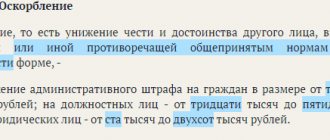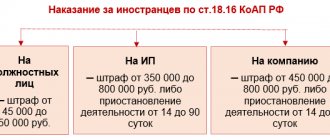Article 282 of the Criminal Code of the Russian Federation
Currently, Article 282 of the Criminal Code of the Russian Federation has gained popularity for insulting on the Internet. The article states that any actions aimed at inciting hostility or hatred and humiliating dignity based on gender, race, nationality and religion, which are committed publicly or using the Internet, must entail liability. This could be the payment of a fairly large fine for insulting someone on the Internet (300-500 thousand rubles) or punishment by forced labor. Also, those punished may be deprived of the right to engage in certain activities and hold certain positions for about 3-5 years. In special cases, this may even be imprisonment for 2-5 years.
Of course, in the situation under consideration, the law is quite loyal and it is unlikely that the offender will end up in prison, but this possibility should not be completely ruled out. This article guarantees the punishment of the offender, subject to the possibility of proving his guilt.
If you are threatened or blackmailed
Today there is no longer any anonymity on the Internet, unless you use the darknet. A threat cannot be anonymous - it always comes from some account, phone number, address. It’s not that difficult to identify even a disguised attacker, especially for law enforcement officers.
Threat or extortion is a much more serious crime than insult. Threat is understood as the intention of one person to cause serious harm to the health of another or take his life (Article 119 of the Criminal Code of the Russian Federation); Blackmail (demanding the transfer of someone else's property... under the threat of disseminating information disgracing the victim or his relatives, or other information that could cause significant harm to the rights or legitimate interests of the victim or his relatives) is devoted to Article 163 of the Criminal Code of the Russian Federation.
If it comes to making a statement to the Ministry of Internal Affairs, list all the circumstances of what happened: who made the threat, where, how exactly, when, under what circumstances and who can confirm the fact of the threat.
To prove the fact of a threat or other negative information, notarized screenshots of correspondence may be required (the service of inspecting pages, personal messages and messages in instant messengers has recently been widely practiced by Russian notaries), which will then serve as an argument in court.
Insult on social networks
Insults in contact, classmates and other social networks are most common and can have dire consequences for vulnerable segments of the population.
Around the time that social networks appeared (and they appeared in our country quite recently), the so-called “trolls” appeared. This group includes people whose communication manners are rude, have a negative connotation and are full of cynicism, rudeness and all sorts of provocations. These people usually create pages with someone else's name, thinking that they are protecting themselves and their affiliation with the abuse cannot be proven. They behave in this way in order to attract attention to their person and raise their, usually low, self-esteem. Insults on social networks also fall under Article 282 of the Criminal Code of the Russian Federation, which provocateurs usually do not think about.
Experienced Internet users usually try not to pay attention to such people, but inexperienced users can be seriously offended by this behavior and ruin their mood for a long time.
You can solve the problem much faster if you order a Call Back
What to do if you are insulted on the Internet
If this happened in an official community on social networks, then you should know that they are usually moderated for unconstructive discussions, so just wait.
If you find yourself in a “wild place,” you always have the opportunity to complain about a comment, indicating the reason as “Insult.” After a complaint, such a comment will be hidden or deleted. For information
Comments on websites are often less well moderated than on social media, but there is also a “Report” option.
If you are insulted in private messages or messenger, you can always block the sender or restrict access to your page. Please note that insults in instant messengers may subsequently be deleted by the sender without the possibility of further confirming the fact that they were there, if necessary.
Responsibility and punishment
To bring someone to justice for insults on social networks, first of all, you need to contact the police and provide evidence, and then write a statement.
If you want to receive compensation, you need to write a letter to the magistrate, who will subsequently receive the case with the claim.
To prove the fact of insult you will need:
- Screenshot of the screen showing the insult. You need to make sure that there is no doubt that the insult is aimed specifically at you.
- Face. The most difficult thing on the Internet in such cases is to prove that this particular person was at the computer at that moment. If there is a witness who can prove this fact, then this will be the best evidence.
After completing these steps, you can go to the police.
It is important not to forget that not everyone succeeds in achieving a positive result in court in this case; most often the case does not go beyond the local police station. A more simplified option would be to contact the administration of the social network or add the user to the “black list”. It is worth noting that the losing party most often bears the costs of paying a lawyer.
People who allow themselves to be insulted on the Internet should be punished; this will serve as a good lesson for the offender and those around him who may behave in a similar way.
If defamatory and false information has been posted about you
Social networks (including YouTube) have recently introduced special flags for moderators regarding misleading, harmful and abusive comments - you can take advantage of the opportunity to complain. Moderators usually respond to such statements quite quickly. To confirm that you are the victim, you may need a passport photo.
If information discrediting your honor and dignity (personal photographs, etc.) is posted on a separate website, the most effective way would be to contact its host and explain that the page contains offensive or law-breaking content. In order to find out who owns a website, you can use the Whois service. Only if you cannot reach an agreement with the hoster, is there a need to contact the authorities (with notarized screenshots).
Arbitrage practice
In practice, such claims are rare, but it is possible that this will soon become commonplace.
In the Yaroslavl region, bailiffs are preparing to conduct enforcement proceedings in a similar case. One woman described her work colleague as a seducer of all the men in the organization where they worked. She then posted the incriminating recording on social media for everyone to see. The offended woman responded by filing a lawsuit, where the offender was ordered to pay a fine of 50 thousand rubles for insulting her on the Internet.
It remains to be expected that soon control of norms of behavior will be at a high level, and judicial practice for insults on the Internet will become more frequent.
| Pass during quarantine | Payment and registration of sick leave during quarantine |
| Article 6.3 of the Code of Administrative Offenses | Article for violating the self-isolation regime |
- Didn't find the answer to your question? Find out how to solve exactly your problem - call right now:
- Federal number -
- Moscow region, Moscow -
- Leningr. region, St. Petersburg -
- It's absolutely free and fast!
How to punish a guilty person
Choosing the path to protect your reputation and the method of punishing the culprit depends on how you were insulted.
You need to establish the person itself.
The task is simplified when a person is registered under his own name.
If there is a pseudonym or another person writes from a specific person, then it is difficult to find the ends on your own. For these purposes, they contact law enforcement agencies with a statement of violation of rights. As a result of the investigation, the owner of the IP address where the bad information came from will be identified. If he does not prove that his resources were taken over by strangers, then he will be the guilty party.
If materials are published in Internet media, then the editor takes responsibility, since he dared to publish, although not his own words, but in his publication.
Parents are responsible for minors (in case of civil liability).
Criminal penalty
Criminal sanctions are the most severe of all types of punishment. Therefore, the violation under criminal law is the most gross and daring.
The Criminal Code provides for 4 articles for obscene behavior on social pages.
Hooliganism. This species is very rare. And this is associated with sharp disrespectful statements addressed to a certain person (group of persons). These obscenities are based on political racial, religious or social hostility. And they are expressed by rough comparisons, assumptions, guesses, statements or in the form of profanity. Or relevant images, video/sound materials.
Slander . Intentional transmission of false information on the Internet that undermines a person’s moral, moral, professional image. In other words, this is a slander that negatively affects the reputation of a citizen.
In this regard, a lie expressed to a person in personal correspondence will not be considered slander. That is, where there are no witnesses, when the dialogue is only between two persons.
Invasion of privacy . Here, a simple collection and broadcast of information entering the intimate space is enough. These are facts and events of a closed nature concerning personal and family secrets. That is, what a person hides from society, what is purely personal. Of course, if we are not talking about criminal secrets.
In this case, the offense is not related to knowingly false information. The information is true, the very fact of its disclosure to the public is illegal. After all, every person has the right to their secrets, and disclosing them can cause mental pain.
Humiliation of human dignity . Public behavior by a person that is intended to humiliate another person by belittling or ridiculing him on the basis of gender, nationality, social status or religious affiliation. And also with the aim of inciting hostility towards persons with the corresponding characteristics. A crime will occur when there has already been a fact of bringing to administrative responsibility for a similar offense under the administrative code.
Unlike hooliganism, when the consequences are not important to the offender (the act itself is what matters), with humiliation there is a specific goal - to cause mental wounds to a person (group of people), showing one’s contempt for gender, nation, religion, position, property status. And all this is considered an insult on the Internet under Article 282 of the Criminal Code of the Russian Federation.
How to protect yourself
First of all, the person from whom the negative comes from should clarify what he meant in his sayings. Perhaps there was some kind of subtext, or there was a technical, targeting or other situational error, a misunderstanding of the situation. Perhaps this citizen will apologize and clear up the misunderstanding.
If the circumstances clearly say that there are no “perhaps”, then you can act with confidence and certainty.
We need to collect evidence. That is, to record the fact of a violation, and not just unfoundedly state the essence of what happened to law enforcement officers. How to collect evidence was discussed above.
You can conduct your own small investigation: identify witnesses, other victims of the offender’s affairs, find out his motives, goals, etc.
Well, in order to punish the culprit, you should file a statement about the crime committed:
- to the police under articles 128.1 (slander) and 213 (hooliganism);
- to the investigative committee under articles 137 (interference with private life) and 282 (incitement of hostility).
Sometimes it is difficult to immediately understand what the crime will ultimately be and under what article for insulting a person on social media. networks will attract the offender. Therefore, it is recommended to submit an application in two copies at once: one to the investigative committee, the other to the police at the place of residence of the victim (applicant). Law enforcement officers will understand the situation and determine among themselves whose jurisdiction will be. If everything is obvious, then you need to submit it to a specific structure.
The application itself is written in free form. The main thing is to present the circumstances in detail, refer to the available evidence, which should be attached (for example, a printout of the WhatsApp correspondence, the part where there were unflattering statements, the names of persons who also received offensive messages from the culprit). If there are doubts about how to correctly qualify what has been done, then it is better not to indicate the article number of the criminal law, but simply limit yourself to the phrase “violation of the law,” “infringement of rights,” etc. This will save you from possible counter-accusation of a knowingly false denunciation.
The addresses of territorial police departments and the Investigative Committee can be found on the Internet. This information is open and easy to find.
Administrative
Administrative proceedings are not as serious as criminal proceedings. But their outcome may entail certain sanctions for the violator. And this is not just a fine for insulting people on social networks. There is also mandatory work and even arrest. And in general, administrative punishment in some cases is the first bell before initiating a criminal case.
Insult. That is, belittling a person’s honor in an indecent manner. Often this is ridicule of shortcomings, vices, character traits, life situations involving the victim, his family connections, and lifestyle. Mockery can be made of both real and fictitious things. The victim is hurt precisely by the form in which the offense is expressed: rude, unprincipled, including in the form of obscene language. And also the attitude of the offender towards the person of the offended: disrespect, cynicism, indifference, demonstration of his superiority, etc. The offender, as a rule, has a goal - to cause mental pain and moral distress.
Humiliation . Unlike the previous offense, issues of sexual, racial, religious, and social discrimination come into view. And in general, a rude person may have the intention of arousing hostile sentiments among the mass of people. If a person is prosecuted for this violation, then if the act is repeated, criminal liability will follow under Art. 282 of the Criminal Code of the Russian Federation.
Minor disorderly conduct . This is a disrespectful message to society, the state, the Constitution, the state. power, symbolism. Such criticism is naturally unfounded and undeserved. In this case, the author, instead of expressing his opinion, simply swears. As a result, such presentation of information belittles the dignity of society and its members. At the same time, there is no exact list of obscene language; it is established individually during the consideration of a specific case by law enforcement officers or a judge.
Where to contact
To protect your name and honor, you need to contact the police, the department at your place of residence. But before applying it is recommended:
- find out the identity of the culprit (if the person is familiar to you);
- make sure that what was done came from a specific person. Sometimes actions can be carried out by outsiders who, for example, have taken over someone else’s Facebook accounts. That is, they pretend to be someone else. To do this, you can ask to clarify who the author of such actions is and what his goal is. But be careful, this could be a scenario for scammers who want to steal funds on cards and the like.
- ask whether the offender has any intention of apologizing, making amends, or compensating for the inconvenience. Here, too, you need to be careful, because if you overdo it, your actions can be regarded as blackmail and turned against you.
Then basic evidence is collected so as not to be unfounded.
And then you can write a statement for insult on social networks, which, along with evidence, is handed over either to the police department or sent by mail.
The inspection must be carried out within 3 to 10 days. You will be notified of the results.
Civil responsibility
We can say that the mildest liability for insulting a person on social networks is civil liability. All sanctions come down to practically two consequences:
- stop further actions and eliminate the infringement of the interests of the injured party;
- compensate for losses, compensate for losses.
Most often, civil cases are filed in addition to criminal and administrative investigations. But is it possible to sue for insult on social networks without a police investigation? Yes, this is the discretion of the citizen. Sometimes one monetary compensation is enough. But there are cases when it is difficult to prove the committed acts in a civil court. Or the attacker is unknown and his identity needs to be established using special methods (which are not available to ordinary citizens). Then it is recommended to first contact the police (SC). The results of their checks will be good evidence for the claim.
Dissemination of defamatory information . Fictitious information that harms a person’s image, reputation, business and personal image. The form in which such information is submitted is not particularly important. Whether it is decent or not, rude or delicate, the slanderer’s speech contains obscenities or normative language, it makes no difference. It is the context that matters, that is, what stain will fall on a person, whether his characteristics will change for the worse. There are three points to consider here:
- the violator’s information is not true;
- the person (who is being slandered) allegedly violated the law or moral standards;
- it is presented in a serious sense that detracts from the status of the person.
But if what is said is true, there is no defense against it. There will be no punishment for public insult on social networks. Since this is not an insult, but an ordinary disclosure of information. Of course, if the informer does not present the information in an abusive (or other obscene) form, or this does not concern personal (family) secrets.
Privacy Data Protection . This means collecting information about a person (about his work, personal preferences, property, source of income, place of residence, birth, etc.). The exception is cases when data is obtained through the activities of law enforcement and regulatory authorities, or the person himself has made such information public.
Manipulations with photographs . Use on the Internet, for example, in the Viber messenger, an image in any format (photo, video) without the person’s consent. This question often arises among parents when photos of their children are published.
Naturally, if the image was taken in public places or the person himself gave permission to shoot, then there will be no violations.
What to do
If a person feels that he has been insulted, then his rights can be protected through legal action. To do this, you need to contact the district/city court at the place of residence of the plaintiff (offended person).
Before going to court, it is recommended to try to resolve the issue amicably if the address (method) of contact with the author is known and if the act deserves forgiveness. Although compliance with the claim procedure is not required.
A statement of claim is submitted to the court, a state fee of 300 rubles is paid, and evidence of illegal actions is presented.
The claim itself is written according to the general rules. It is imperative to indicate that honor and dignity are affected and to describe and explain as much as possible how this is expressed.
If you win, the court will prohibit the collection and dissemination of information, or will order the data to be deleted, a refutation will be posted, and an apology will be ordered, including a public one. The execution of a judicial act is controlled by bailiffs. True, the practice is not particularly well established.
Compensation for moral damages is also available. The amount is determined independently depending on the specific circumstances of the case, taking into account the experienced moral suffering of the plaintiff. This is precisely what needs to be specifically confirmed. For the court, specific facts are needed to confirm the fact of the experience.
For example , a person was fired because of defamatory information. Which led to a lack of money and for a certain time (during the period of absence from work) the plaintiff was in need of food, clothing and other household needs. All this affected both physical and mental state. Therefore, a dismissal order, a certificate of lack of income, and the employer’s testimony about the reasons for dismissal will be significant evidence
.
Responsibility measures
If you follow the paragraphs of Article 5.61 of the Administrative Code, those accused of insulting another person may face:
- derogatory statements made in an indecent form - a fine of up to 3,000 rubles for individuals, up to 30,000 for officials, up to 100,000 for legal entities;
- insult committed publicly, in materials on display or through the media - a fine of up to 5,000 rubles for a citizen, up to 50,000 for an official, up to half a million rubles for a legal entity;
- in case of connivance and failure to take measures to prevent insults, officials can be fined 30,000 rubles, legal entities - 50,000.
In addition, do not forget about Article 151 of the Civil Code, which implies the recovery of compensation from the perpetrators for moral damage caused. Within the framework of this article, it is clearly stated that moral suffering caused can be compensated in monetary form from any type of income or property of the offender. The amount of compensation has no established limit and is assigned individually, based on the degree of guilt and the moral damage actually caused to the victim. The decision is made by the court.
Download for viewing and printing:
Article 151 of the Civil Code of the Russian Federation “Compensation for moral damage”
Personal insult via the Internet
Russian users joined the Internet quite late compared to the rest of the world. For example, in the USA, the World Wide Web began to develop in the mid-90s of the last century; in Russia, this peak occurred approximately in 2005-2007. However, with the widespread adoption of this technology, a new concept has emerged: the Internet troll. Trolling refers to provocative actions and rudeness, which often involves direct insult to other people. Given that it is possible to remain anonymous on the Internet, this movement is gaining momentum, making social networks unsafe, especially for children.
Step-by-step description of the procedure
- If you find an offensive statement or recording (audio, photo or video), you must take a screenshot of the page.
- Next, you need to send a request to the Russian Research Institute for the Development of Public Networks (RosNIIROS), where you can find out the address of the owner of the site that published the insult.
- If you cannot obtain an address, then you need to contact one of the structures listed above. Employees of these government agencies will identify the offender themselves during the investigation. To file a complaint, you must write a statement. The document is drawn up in any form, but must contain the following information:
- Applicant’s full name, residential address and passport details;
- date and address of the website on which the insult was committed;
- the essence and content of the offensive statement (photo, video or audio recording);
- all known information about the offender (if possible);
- the requirement to punish the offender and recover compensation for moral damage caused;
- list of attached evidence;
- the applicant's signature and the date the document was drawn up.
Methods of combating online abuse will be discussed in the video below.











